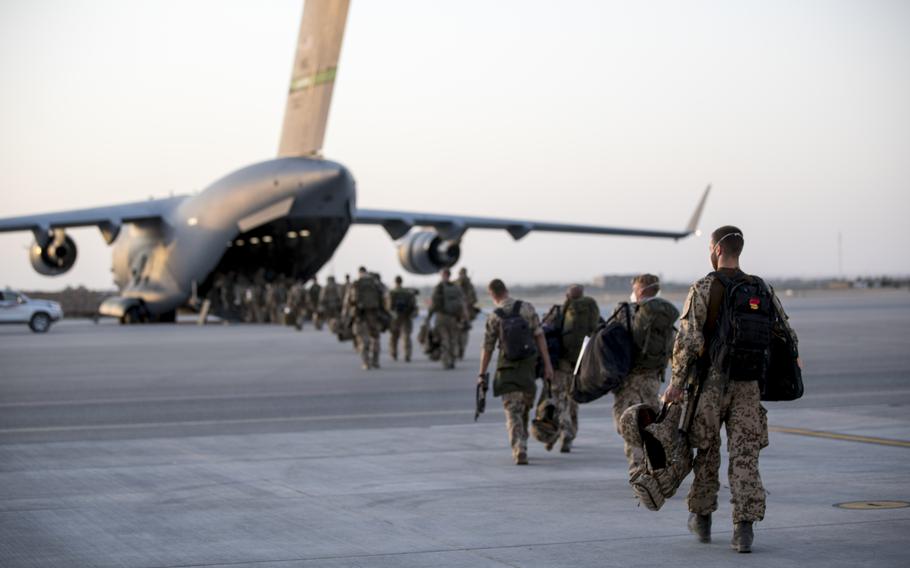
The German mission in Afghanistan ends with service members heading to the last Airbus A400M leaving the Mazar-e-Sharif airfield for home, June 29, 2021. (Torsten Kraatz/German army)
European Union nations rallied around a push to create a military force of some 5,000 troops in the wake of the Afghan withdrawal, but they have yet to agree on many of its details.
Defense ministers meeting in Slovenia repeatedly referred to the Afghan evacuation as a "fiasco" and "debacle" on Thursday, appealing for the EU's military capability to be strengthened, according to officials familiar with the closed-door talks. Slovenia currently holds the rotating presidency of the EU.
The U.S.-led withdrawal from Afghanistan and its speed, as well as the violence and chaos that plagued efforts to evacuate civilians, have shaken EU governments that are increasingly seeking a way to assert the bloc's strategic autonomy, including militarily. That involves a balancing act with European nations' commitment to the North Atlantic Treaty Organization.
Ministers supported an effort by Josep Borrell, the EU's foreign policy chief, to create an "initial entry force" of about 5,000 personnel, which would aim for fast and efficient deployment in crisis areas, the officials said.
"Afghanistan has shown that the deficiencies in our strategic autonomy come with a price," Borrell told reporters after the talks. "The only way forward is to combine our forces and strengthen our capacity and our will to act" which means "new tools like this entry force," he said.
But making the plan a reality is fraught with hurdles. Ministers see Afghanistan as a wake-up call, but with the U.S. pulling out so recently on Aug. 31, it's still too early for a practical response by the EU, one official said.
Although no one spoke out against the figure of 5,000, there was no discussion on the force's make-up or who would decide how it would be used. EU members are considering the possibility of switching from the bloc's usual unanimous voting procedures to a majority vote for deployment of the force, the officials said.
"We have the armies, all together, we have the resources, the problem is to have the coordination, and the will to mobilize these resources," Borrell said.
Defense ministers also discussed how to map relations with the new Taliban rulers. "We have to develop a condition-based engagement for everything, even to provide humanitarian assistance," Borrell said.
Separately, Germany and France on Wednesday circulated a paper setting out five conditions that should set the basis for engaging with the Taliban:
— The Taliban can't hinder the departure of Afghans who want to leave the nation.
— They must break ties with terrorist organizations, including al-Qaida.
— They must allow free access to humanitarian aid.
— They must respect human rights, especially women's rights.
— They must establish an inclusive, representative government.
The proposal, which was shared with member states at a meeting of EU ambassadors and seen by Bloomberg, also called for the need to fight against the production and export of drugs.
The EU's foreign affairs service told the diplomats that evacuations from Kabul had not yet been completed and there was still a need to relocate former EU Police Mission staff as well as people who had worked for the EU. The European Commission that added it was looking into the creation of a humanitarian corridor and was sending an envoy to the region this week, according to a person with knowledge of the discussion.